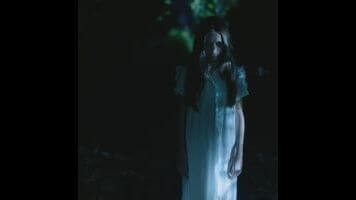House Of Darkness is Lifetime’s pallid version of a horror movie

House Of Darkness, the new haunted house movie from Lifetime Movie Network, plays like a horror movie told secondhand by people who don’t like or understand horror movies. What scares are attempted are either derivative of the most obvious sources (Halloween, The Shining, The Amityville Horror, The Orphanage, more) or so perfunctory (as in the trio of final “twists”) that they feel like sheepish apologies for trying to scare viewers in the first place. They needn’t have bothered—it’s hard to imagine who could be scared by anything in House Of Darkness, or involved on any level, for that matter.
“Inspired by a true story,” the film starts out on Halloween 1957, so that director Patrick DeLuca can ape one of John Carpenter’s slow POV shots around a tree while a pair of trick-or-treaters shriek as they disappear into the titular, nondescript suburban house. Cut to the present, as married couple Kelly (Sara Fletcher) and Brian (Gunner Wright) explain to their marriage counselor that they are moving out of the city and into the country to work on their problems. “And Brian, do you feel that you’re over your jealousy issues?” asks the therapist helpfully, introducing a dynamic from which the couple never wavers, as Brian looks resentful and put-upon while Kelly responds with worry and a hint of scolding.
It turns out that Brian is not, in fact, over his jealousy issues, signaled by his immediate scowl once he sees Kelly waving at the sexy new neighbor and her always-shirtless boyfriend. “You could have taken a picture and it would have been less awkward,” snarks Brian to his wife, the sort of bafflingly juvenile dialogue Wright’s given to express his suspicions about his blameless wife throughout. The film fitfully employs the gimmick of the couple’s therapist-mandated video diaries so they can prosaically state the exact worries to the camera that they’ve spoken to each other all over again. For the blandly handsome Brian, it’s jealousy over his wife’s career as a massage therapist, expressed in terms so childish they seem written by a middle-schooler. Telling the camera about his suspicions, this adult male stammers out, “I came home more than once to find these clients all oiled up—and they weren’t like old or fat. And she’s rubbin’ them down like a… you know what.” (The word he’s looking for is “prostitute.”)
Wright’s performance in the film isn’t just bad, it’s weirdly remote from human behavior. At times, he’ll say something intended to be a joke, then wait until the last word is out of his mouth before smiling. In a pet funeral scene, the camera cuts back to momentarily catch him with a genuinely unsettling simulacrum of a comforting smile pasted on his face. House Of Darkness is clearly going for a Shining vibe as the family man is transformed by the, well, house of darkness. But as the film goes on, his shift into obsessive behavior (he’s constantly sanding a single table in his workshop), meant to indicate the nondescript house’s malign influence over him, instead just looks like bad, inconsistent filmmaking. (There’s no credited screenwriter for the film, with a LMN source explaining the film is a “team effort” from producers Painless Television.)
As for Kelly, Fletcher, too, is stuck playing out an under-imagined type, in her case the beleaguered perfect wife. For Kelly truly is blameless, her identical response to every situation—her husband’s drinking, her teen daughter’s increasingly odd behavior, the occasional dead pet—is a pert, long-suffering sigh, often coupled with a passive-aggressive word or two of gentle rebuke. (If something startles her, she will let out a little yip.) In the Lifetime universe, the wife and mother is the constantly besieged guardian of the normal (the sacred family unit) against the infiltration of the abnormal (anything threatening the family unit), and Fletcher’s Kelly is an especially tiresome example of the breed. While there’s not much the actress can do against such a wet blanket of a role, Fletcher’s one expression—brow-wrinkled concern, with a hint of disapproval—is enough to make her quickly insufferable, as she treats both husband and daughter with the same air of a mom who’s not mad, just disappointed. Even her position as the sole sensible one amidst the spooky goings-on in the house is undermined by how uncurious she is when, say, she finds a smoldering hunk of unidentifiable meat in her new stove and responds with a mildly distressed shrug before tossing it into the bin.
As the house’s evil past gradually comes to light, House Of Darkness half-assedly springs a horror cliché from time to time. There’s a secret room, bloody visions, little kids in masks, a psychic who senses terrible things, flashbacks to horrible deeds, some CGI bees. But the film’s idea of high tension is to have the couple’s unhappy daughter, Sarah (Mykayla Sohn), disappear unexpectedly (which she does three times), as her parents walk through the dark incessantly calling her name. (The final count: 27 “Sarah!”s. This is the kind of movie that sees a viewer keeping track after a while.) Meanwhile, director DeLuca (veteran of paranormal reality shows like My Haunted House and Ghost Bait) flattens every image for maximum TV dullness when not dropping in inexplicably disjointed interactions that don’t contribute to the eeriness as much as they make House Of Darkness look inept. (Despite living 20 feet away, the sexy neighbors ring the doorbell, leave an unwrapped pie on the ground with a note, and stand waving cheerfully from their own house.)
In the end (apart from those final twists, cribbed feebly from a thousand other places), House Of Darkness is Lifetime attempting to transport its “family unit in danger” formula into the horror genre, but the filmmakers here are simply out of their depth. Horror has a language all its own, and House Of Darkness doesn’t speak it.